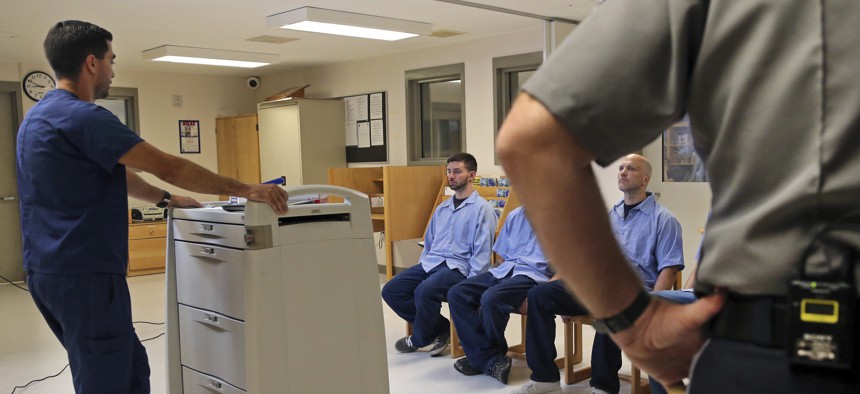State Health Officials Say Medicaid Expansion Helped Combat Opioid Epidemic

In this July 23, 2018, photo, inmates at Franklin County Jail in Massachusetts are watched by nurse Brian Toia, left, and a corrections officer after they received their daily doses of buprenorphine, a drug which controls heroin and opioid cravings. AP Photo/Elise Amendola

Connecting state and local government leaders
Health officials from Rhode Island, Massachusetts, North Carolina, West Virginia, and Pennsylvania testified before a congressional committee about how states have used federal opioid funding.
Expansion of Medicaid has allowed states to more broadly fund prevention and treatment initiatives to battle the opioid epidemic, state health officials told a congressional committee on Tuesday.
In Pennsylvania, Medicaid expansion meant the state’s Department of Drug and Alcohol Programs was able to treat an additional 125,000 patients, Jennifer Smith, the agency’s secretary, told a U.S. House Energy and Commerce subcommittee on Tuesday. The state received has about $230 million in federal funding to pay for prevention, treatment and recovery for people dealing with opioid use disorder.
Without Medicaid expansion, the state “would be spending all of those dollars on plain old treatment,” Smith said. “As a result of Medicaid expansion, we have been able to repurpose those dollars in ways that allow us to modernize the system, integrate with physical health, mental health, behavioral health in one system all going forward.”
That means the state had funding for a loan repayment program that encourages doctors and others supporting substance abuse recovery to relocate and work in rural areas experiencing high levels of opioid addiction, as well as a program that provides medication-assisted treatment (MAT) to inmates in the state’s correction facilities, she said.
Public health officials from five states—Rhode Island, Massachusetts, North Carolina, West Virginia, and Pennsylvania—testified before the House committee to provide an update on states’ efforts to battle the opioid epidemic.
Four of the five states had expanded Medicaid coverage and health leaders told the committee it was a crucial policy decision, saying it helped provide much needed funding for opioid treatment and recovery efforts.
State health officials’ testimony was also backed up by a recent Journal of the American Medical Association article, which found states that expanded Medicaid had 6% lower opioid overdose death rates than states that did not expand access.
Republican lawmakers have previously blamed Medicaid expansion for increased access to opioid prescriptions and an uptick in overdose deaths.
Thirty-six states and Washington, D.C., have opted to expand Medicaid coverage under the Affordable Care Act, which allows states to offer coverage to low-income adults who make up to 138% of the federal poverty level and requires coverage parity of mental health and substance use disorder services. Last week, the Democratic governor of Kansas, Laura Kelly, reached a deal with a key Republican lawmaker to expand, but their agreement would need to be approved by the legislature.
In North Carolina, which has not expanded Medicaid, state health officials estimate that 415 residents who died from opioid-related overdoses would be alive today had the state expanded access. Currently, more than two-thirds of federal opioid response grants that North Carolina receives is going toward treatment or to pay for people who are uninsured to get treatment, said Kody Kinsley, the deputy secretary for Behavioral Health and Intellectual and Developmental Disabilities in North Carolina.
“That is a laudable and notable purpose for those dollars, but we do not have those dollars available for building our workforce, training our individuals, to increasing the way our systems work together and coordinates care,” Kinsley said. “Instead we are expanding treatment because we do not have Medicaid expansion in North Carolina.”
North Carolina Gov. Roy Cooper, a Democrat, wants to expand Medicaid, but the Republican-led legislature has resisted, with lawmakers saying they are afraid it will eventually become too expensive.
State officials testified about numerous ways they have used federal grant funding to pay for opioid recovery initiatives, as well as current challenges they face.
West Virginia has been able to use federal funding to increase treatment capacity, said Christina Mullins, the commissioner of the state’s Bureau for Behavioral Health. Between 2017 and 2019, the state increased the number of residential treatment beds from 197 to 740 and doubled the number of doctors who can prescribe buprenorphine, the most commonly used form of medication-assisted treatment.
But with 21,400 Medicaid patients prescribed MAT last year, the state doesn’t have the number of treatment professionals needed and identifies workforce capacity as an ongoing concern.
“I do not have enough people to deliver the treatment that is needed for the state,” Mullins said. “We could open up more days for prescribers but we do not have the therapists to be able to support that prescribing.”
Massachusetts, Rhode Island and Pennsylvania had all used federal funding to help expand access to MAT among people who are incarcerated or were recently released.
Fatal opioid overdose rates have started to decline in each of the five states on the panel, but health officials warned that they have begun to see an uptick in overdoses related to methamphetamines. As a result, some suggested that future federal funding should be more flexible so money can be used for broader substance use disorder treatment and mental and behavioral health programs.
Andrea Noble is a staff correspondent with Route Fifty.

NEXT STORY: Texas Can’t Quit the Aoudad




